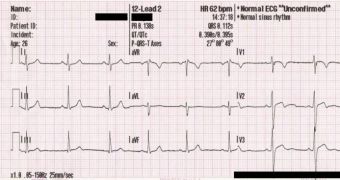Scientists at the Monash University announce the creation of a new technique for detecting and diagnosing mental and neurological illnesses, which they argue is so efficient, that it's able to detect depression in less than an hour. The new method has been dubbed with the catchy name “electrovestibulography,” and its creator, MU biomedical engineer Brian Lithgow, says that it can be likened to an “ECG for the mind.” In electrocardiography (ECG), the electrical activity of the heart is recorded from outside the body, via sensors placed on the skin.
“The patient sits in a specially designed tilt chair that triggers electrical responses in their balance system. A gel-tipped electrode placed in the individual's ear canal silences interfering noise so that these meaningful electrical responses are captured and recorded. The responses are then compared to the distinct biomarkers indicative of particular CNS disorders, allowing diagnosis to be made in under an hour,” Lithgow explains about how the new diagnostics system operates.
The entire method relies on detecting, recording and interpreting the activity of the vestibular system, which is intimately connected to an area of the primitive brain that is related to controlling emotions and behavior. Upon examining this system, the MU expert realized the potential that it had on determining mental-health statuses, and set out to create a method of tapping into this potential. In a series of experiments conducted at the university's Alfred Psychiatry Research Centre, the scientist analyzed various types of Central Nervous System (CNS) disorders, such as depression and schizophrenia, and determined a series of reoccurring patterns, or biomarkers, for each of them.
“This could be one of the most significant inventions ever to come out of Monash. CNS disorders cost upwards of $2 trillion globally and affect one in four people sometime in their lifetime. At present, diagnosing these conditions is done almost exclusively by qualitative measures, through questions and interviews, and it can take many years for sufferers to be correctly diagnosed,” Dr. Roger Edwards, the CEO of Neural Diagnostics, explains. “We are doing the necessary research and development and getting independent expert reports done, but results so far are cause for great optimism,” he concludes.

 14 DAY TRIAL //
14 DAY TRIAL //